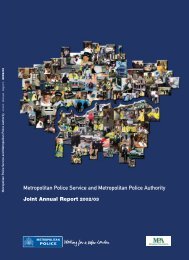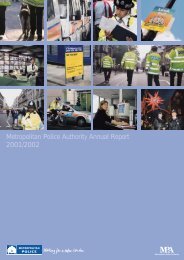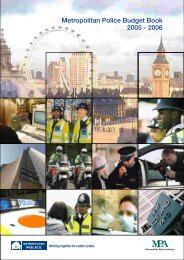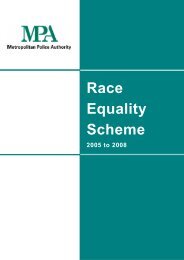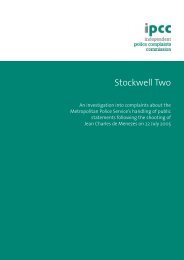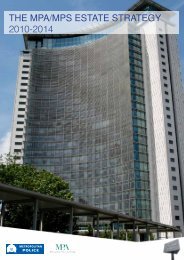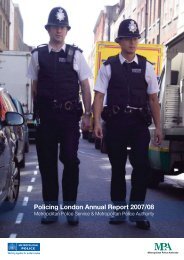Final Report of the Morris Inquiry: The Case for Change
Final Report of the Morris Inquiry: The Case for Change
Final Report of the Morris Inquiry: The Case for Change
Create successful ePaper yourself
Turn your PDF publications into a flip-book with our unique Google optimized e-Paper software.
THE CASE FOR CHANGE<br />
2.44 <strong>The</strong>re<strong>for</strong>e ‘ordinary’ employees have, it could be argued, ‘caught up with’<br />
and indeed overtaken police <strong>of</strong>ficers by gaining <strong>the</strong> benefit <strong>of</strong> written contracts and<br />
a number <strong>of</strong> statutory rights.<br />
2.45 <strong>The</strong> position <strong>of</strong> police <strong>of</strong>ficers has, <strong>of</strong> course, not remained static as,<br />
incrementally, <strong>the</strong>y have been subject to a wide range <strong>of</strong> legislation benefiting<br />
‘ordinary’ employees. Police <strong>of</strong>ficers are today covered by:<br />
● Equal Pay Act 1970;<br />
● Health & Safety at Work Act 1974;<br />
● Sex Discrimination Act 1975;<br />
● <strong>The</strong> Race Relations Act 1976;<br />
● Disability Discrimination Act 1995;<br />
● Human Rights Act 1998;<br />
● Working Time Regulations 1998;<br />
● Part-time Workers (Prevention <strong>of</strong> Less Favourable) Treatment Regulations<br />
2000;<br />
● Employment Act 2002;<br />
● Employment Equality (Sexual Orientation) Regulations 2003; and<br />
● Employment Equality (Religion or Belief) Regulations 2003.<br />
2.46 <strong>The</strong> rights conferred by <strong>the</strong>se legislative provisions have served to enhance<br />
<strong>the</strong> rights <strong>of</strong> police <strong>of</strong>ficers in some circumstances and have not proved to be<br />
inconsistent with <strong>the</strong>ir status as <strong>of</strong>fice holders under <strong>the</strong> Crown.<br />
2.47 Under <strong>the</strong> previous police complaints and discipline regime <strong>of</strong> <strong>the</strong> Police Act<br />
1996, <strong>the</strong> following regulations governed <strong>the</strong> relevant procedures:<br />
● Police (Complaints) (Mandatory Referrals) Regulations 1985;<br />
● Police (Anonymous, Repetitious etc Complaints) Regulations 1985;<br />
● Police (Complaints) (In<strong>for</strong>mal Resolution) Regulations 1985;<br />
● Police (Complaints) (General) Regulations 1985;<br />
● Police (Complaints) (General) (Amendment) Regulations 1988;<br />
● Police (Dispensation from Requirement to Investigate Complaints)<br />
Regulations 1990;<br />
● (Police Appeals) Tribunal Rules 1999;<br />
● Police (Efficiency) Regulations 1999;<br />
● Police (Conduct) Regulations 1999;<br />
● Police (Conduct) (Senior Officers) Regulations 1999; and<br />
● Police (Efficiency) (Amendment) Regulations 2003.<br />
2.48 Under <strong>the</strong> new regime created by <strong>the</strong> Police Re<strong>for</strong>m Act 2002, which came<br />
into <strong>for</strong>ce on 1st April 2004, <strong>the</strong> following regulations already have effect:<br />
● Police (Complaints and Misconduct) Regulations 2004;<br />
● Police (Conduct) Regulations 2004;<br />
38


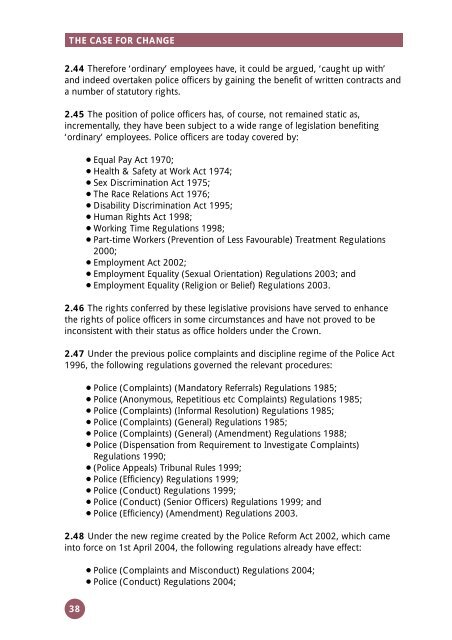
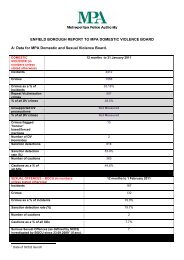
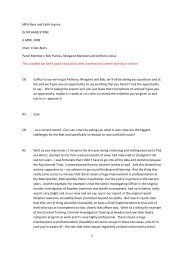
![Appendix 1 [PDF]](https://img.yumpu.com/51078997/1/184x260/appendix-1-pdf.jpg?quality=85)
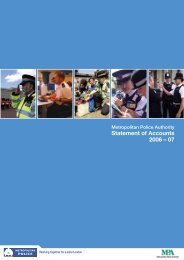
![Transcript of this meeting [PDF]](https://img.yumpu.com/50087310/1/184x260/transcript-of-this-meeting-pdf.jpg?quality=85)
![Street drinking in Hounslow [PDF]](https://img.yumpu.com/49411456/1/184x260/street-drinking-in-hounslow-pdf.jpg?quality=85)

